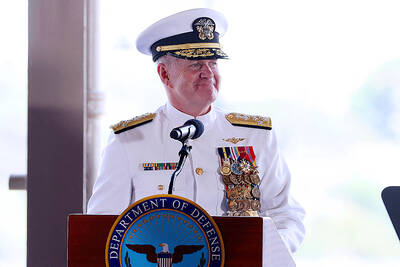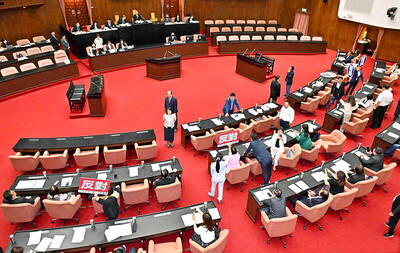Democratic Progressive Party (DPP) presidential candidate Frank Hsieh (謝長廷) said yesterday the DPP's position on building a "nuclear-free homeland" remained unchanged.
However, he emphasized that the administration was bound by a legislative resolution to continue building the Fourth Nuclear Power Plant.
Hsieh was responding to former Academia Sinica president and Nobel laureate Lee Yuan-tseh's (李遠哲) support for the construction of the nuclear power plant. Lee issued a statement on Monday urging the presidential candidates to support the construction of the Fourth Nuclear Power Plant. The statement was issued by Academia Sinica on behalf of its environment and energy team. Lee is the convener of the group.
The statement said the nation could not obtain sufficient alternative sources of energy and was bound to increase the consumption of coal-fired power if construction of the plant were halted.
While coal took up 32 percent of the nation's total energy in 2000, the statement said that figure is expected to jump to 44 percent in 2025. Carbon dioxide emissions would then increase by 60 percent in 2025 from the 2000 levels, the statement said.
Hsieh said that if elected, his administration would initiate no new nuclear power plant projects and replace the old units with newer, more efficient and lower risk ones.
Lee said yesterday that he had talked to former DPP chairman Lin I-hsiung (林義雄), who has vigorously lobbied for a referendum to decide the fate of the new nuclear power plant.
"He did not completely oppose the idea of postponing the nuclear-free homeland policy for 50 years," Lee said.
Nuclear power is a better and more feasible source of energy given the nation's limited energy resources, Lee said in a speech at Academia Sinica yesterday morning. It was necessary to continue the operation of the First and Second nuclear power plants because effective ways of handling nuclear waste were now available, he said.
Lee dismissed speculation that his actions were politically motivated, saying he was just doing what he thought was right. Lee's last-minute endorsement of President Chen Shui-bian (陳水扁) in the 2000 presidential election campaign was seen by some as a key factor in Chen's victory.
Meanwhile, Hsieh yesterday attributed the recent announcement of a relaxation of cross-strait economic policy to successful internal party negotiations.
Among the measures proposed was one to attract Taiwanese businesspeople based in China to return home by offering them technological assistance, capital and labor.
Hsieh, who advocates a more liberal cross-strait economic policy, said he would push for the development of a low-risk, low-polluting manufacturing industry that would increase job opportunities.
While it was government policy to encourage Chinese investment, Hsieh said his understanding was that Chinese investors would still be barred from buying property.
Hsieh said he had always opposed Chinese investment in the real estate market because property would become less affordable for younger people if prices rose because of Chinese investors.
While the real estate sector might welcome Chinese investment for the sake of short-term profits, Hsieh said he had always opposed it because it was bound to do more harm than good to the economy.
"I don't think the Executive Yuan or the Mainland Affairs Council [MAC] would allow this to happen because we have talked about it," he said.
Hsieh was responding to questions about a report published in yesterday's Chinese-language China Times, which said that the MAC was expected to allow Chinese nationals to invest in the local real estate market and to ease the limits on the percentage of funds they could borrow against such property.
The report said the MAC was also planning to allow Chinese nationals to borrow money from financial institutions without providing any source of collateral and to extend the period Chinese nationals could stay in Taiwan from 10 days to 90 days.

INSPIRING: Taiwan has been a model in the Asia-Pacific region with its democratic transition, free and fair elections and open society, the vice president-elect said Taiwan can play a leadership role in the Asia-Pacific region, vice president-elect Hsiao Bi-khim (蕭美琴) told a forum in Taipei yesterday, highlighting the nation’s resilience in the face of geopolitical challenges. “Not only can Taiwan help, but Taiwan can lead ... not only can Taiwan play a leadership role, but Taiwan’s leadership is important to the world,” Hsiao told the annual forum hosted by the Center for Asia-Pacific Resilience and Innovation think tank. Hsiao thanked Taiwan’s international friends for their long-term support, citing the example of US President Joe Biden last month signing into law a bill to provide aid to Taiwan,

China’s intrusive and territorial claims in the Indo-Pacific region are “illegal, coercive, aggressive and deceptive,” new US Indo-Pacific Commander Admiral Samuel Paparo said on Friday, adding that he would continue working with allies and partners to keep the area free and open. Paparo made the remarks at a change-of-command ceremony at Joint Base Pearl Harbor-Hickam in Hawaii, where he took over the command from Admiral John Aquilino. “Our world faces a complex problem set in the troubling actions of the People’s Republic of China [PRC] and its rapid buildup of forces. We must be ready to answer the PRC’s increasingly intrusive and

STATE OF THE NATION: The legislature should invite the president to deliver an address every year, the TPP said, adding that Lai should also have to answer legislators’ questions The Chinese Nationalist Party (KMT) yesterday proposed inviting president-elect William Lai (賴清德) to make a historic first state of the nation address at the legislature following his inauguration on May 20. Lai is expected to face many domestic and international challenges, and should clarify his intended policies with the public’s representatives, KMT caucus secretary-general Hung Meng-kai (洪孟楷) said when making the proposal at a meeting of the legislature’s Procedure Committee. The committee voted to add the item to the agenda for Friday, along with another similar proposal put forward by the Taiwan People’s Party (TPP). The invitation is in line with Article 15-2

Premier Chen Chien-jen (陳建仁) and the Ministry of Foreign Affairs yesterday denounced Chinese Nationalist Party (KMT) Legislator Hsu Chiao-hsin (徐巧芯) for making false allegations about donations to Ukraine and disclosing confidential documents, with the ministry saying that it would take legal action. The ministry last year signed an agreement with the Czech Republic on a healthcare project to assist Ukraine, which is to be carried out by the Czech Health Technology Institute. Hsu accused the ministry of being indirectly involved in the party politics of the Czech Republic as institute chairman Petr Foit is a local medical supplier, and has close political